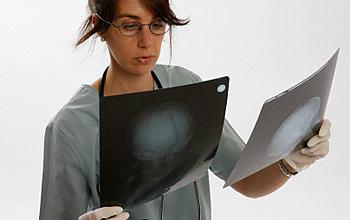Complete Health Reporting: More Treatment Isn’t Always Better

Your grandmother calls you on the phone and says that she went to the doctor that morning and they found a tumor in her nasal cavity. She says they don’t know if it’s cancerous, but they want to remove it as a precaution.
You say, “You should do what the doctor tells you and have the surgery.” And with good reason. You’re not a doctor, and you assume that the doctor knows best.
Chris Knap, the investigations editor at the Orange County Register, questioned that assumption in great detail for a story that allowed me the wonderful opportunity to team up with him. Never had I seen a reporter so cool and calm during a tough interview. Knap went right to one of the busiest surgeons in the county and asked him point blank and repeatedly why he was so inclined to operate and how he explained the fact that when he did operate, he sometimes left his patients worse off than they were before.
Just asking those types of questions is a leap for many reporters because another baseline assumption many of us all have is that more care is better. More screening is better. All problems can be solved through prescriptions and surgeries.
But a story should never focus on a surgical approach or a drug treatment while never mentioning the other options, as I wrote on Friday.
Here’s why. In health care, sometimes less is more. And when you present to readers that newer is always better or more is always the right answer, you are not only contributing to the huge health care bill we all pay as taxpayers and insurance rate payers in the U.S. You also are contributing to a lot of unintended consequences: Addictions to pills; injuries during surgeries, healthcare-associated infections.
One large study, first previewed at an American Urological Association (AUA) conference in 2011, found that for many men with early-stage prostate cancer, surgery showed no benefit. The best course of action in this case was actually no action at all, just “watchful waiting” by both the patient and his doctor. Pieter Droppert, editor of the Biotech Strategy Blog, wrote:
The conclusion from this data is that low risk, early stage prostate cancer patients should be observed by “watchful waiting” rather than undergo radical prostatectomy (RP). This may have a financial impact on urologists who previously may have favored RP in low risk patients.
It’s that financial impact that you have to think about when you are asking your physician for a recommendation or when you are talking with a physician as an expert in a particular line of treatment.
In the case of a grandmother with a tumor, the risk of damaging a nerve and causing paralysis in an older patient could be higher than the risk that she would die from the tumor. This is what Knap found when reviewing patients’ medical records with experts in the field. They told him that, given the same circumstances, they would have opted to avoid an operation because the chances were good that the patient would have lived unharmed by the tumor and died from an unrelated cause.
If treatment is the answer, there’s also a question about the extent of the treatment. I’ll write about that in my next post.
Image by Tips Times via Flickr

